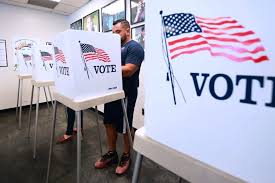NEW YORK: The 42 Broadway in New York is an important address in this election season in the US.
This is the office of the Board of Elections. Michael Ryan, executive director, and his deputy Vincent Ignizio are upbeat about the figures that the early voting has drawn for the city. On the first day, about 140,000 votes were cast in the early voting.
“We don’t want to pat ourselves on the back but we are upbeat about this. New York has already created a record in early voting and it is still on,” says Ryan.
Across the United States, tens of millions of voters have already cast their ballots. According to the data from the University of Florida’s Election Lab tracker, more than 68 million Americans have already voted.
Across the nation, voters are taking advantage of the flexibility offered by early voting options, whether through mail-in ballots or in-person polling sites.
This trend allows voters to avoid potential issues such as inclement weather, long queues, or unforeseen scheduling conflicts on election day. Ryan feels that several factors played a role in ensuring the positive trend in early voting, at least for New York City (NYC).
“In 2020 less than 100 polling stations were set up for early voting. This year the number is almost 50 per cent more than that,” says Ryan.
An early voting station has been set up at the John Jay College in the Manhattan area of NYC. The station is packed with voters coming in and casting their ballots days ahead of the main election day on November 5.
Suzan, the coordinator of the station, feels the early voting process is witnessing a very positive response.
“We have been busy here and we are trying to ensure everyone coming here receives all assistance required. The people are clearly excited about early voting,” says Suzan.
This growth in early voting reflects a fundamental shift in American voting behaviour, suggesting a continued trend toward more flexible voting options in future elections.
“I like the flexibility of this system. I don’t want to waste my vote just because I may not be available on Tuesday. This is a crucial time for the country and we cannot afford to not be casting our vote for the person who should lead us,” says a voter at John Jay College in New York.


